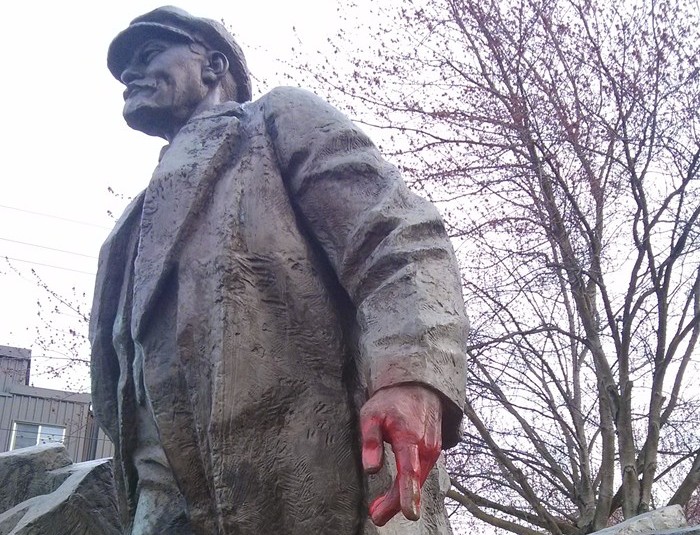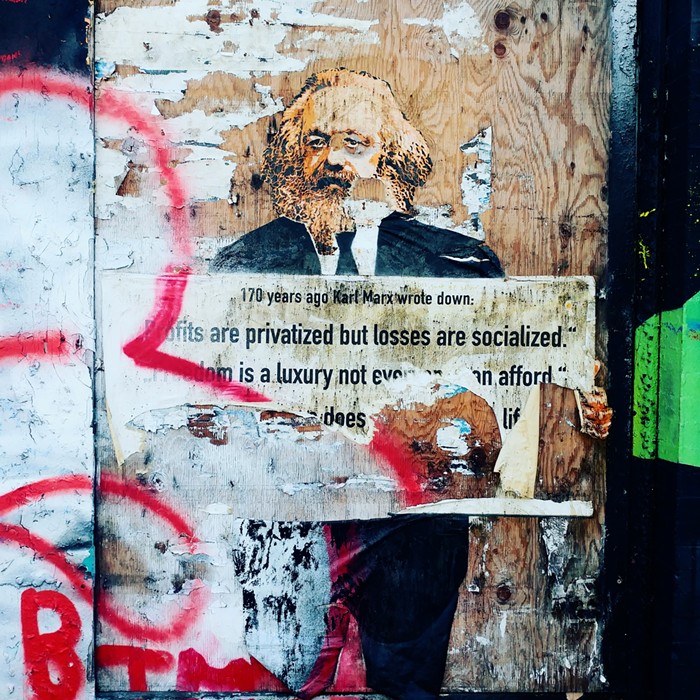UPDATE: On Thursday afternoon the Seattle Times announced David Volodzko is no longer with the company. Upon hearing the news, Charles Mudede said, "I'm dying."
"Dear Fremont: We need to talk about Lenin and your statue of the genocidal tyrant" is David Volodzko's first column for the Seattle Times. It was posted on July 7. It concerns, of course, the controversial statue of Lenin at the heart of our city's capital of quirkiness. (My readers very well know my position on and, more importantly, theory of quirkiness.) There are glops of history in this post, and some scenes from Volodzko's upbringing. I understand he was in rural Georgia before moving to Seattle. He has something to say about Confederate statues in the South. Martin Luther King Jr. is also stirred into this mess he calls "a history lesson."
The point of the post? Volodzko believes Lenin was a monster like no other. He killed many millions, conducted "secret police raids," and committed atrocity after atrocity: "mass torture, extrajudicial killings and public executions." The columnist's grandfather, who escaped from a Nazi concentration camp, thought "[t]he only thing worse [than Hitler's Germany]... was the Russia Lenin had built." Volodzko also expressed this opinion in several tweets.
In fact, while Hitler has become the great symbol of evil in history books, he too was less evil than Lenin because Hitler only targeted people he personally believed were harmful to society whereas Lenin targeted even those he himself did not believe were harmful in any way.
— David Josef Volodzko (@davidvolodzko) July 8, 2023
Mercy, mercy me, I can't make head or tail of Volodzko's column or even the reasoning in his tweets. Indeed, he has reduced me to something I rarely encounter as a culture critic: a Wittgensteinian silence ("That of which we cannot speak, we must pass over in silence"). But how was this newcomer able to do what I considered impossible until this morning? I always have something to say about Brandi Kruse's tweets and podcasts. The same goes for posts by Jason Rantz and Danny Westneat (who is also with the Seattle Times). The answer is simple: Voldodzko's recent comments about Hitler, Lenin, MLK, Cossacks, concentration camps, Fremont, Confederate statues, and what have you are not structured by a theory.
And judging from one of Voldodzko's attempts to present a theory, which is found in his 2016 post for The Diplomat, "Why Are Chinese Tourists So Badly Behaved?" it is very clear that he does not quite understand the function of a theory, which is to present an explanation that has considerable (or at least some) power. His theory, if we can even call that: Chinese tourists are worse than American ones because the latter has faced and apparently been humbled by criticism from "people like Elie Wiesel, Martin Luther King, Jr., Cesar Chavez, Bell Hooks, Harvey Milk, Sylvia Rae Rivera, Mona Eltahawy, and Noam Chomsky." Chinese tourists are basically savages because they live in a country that squashes any kind of criticism. This is why they beat worshippers and waitresses in South Korea to a pulp or death. As you can see, this is hardly a theory at all. It explains next to nothing.
And this brings me to my point: Theory really matters. And not just any old theory, such as the ones employed by Kruse, Rantz, Westneat, and Seattle Times' editorial board. But theories that are structurally deep. The deeper a theory is, the greater its explanatory power. But this fact presents a problem for the bulk of commentators in the mainstream. There is, if I can borrow an expression found in the introduction to Hegel's Phenomenology of Spirit, no "royal road" to a theory that makes proper sense of cultural and historical developments.
A proper theory is the product of years of very careful reading and construction. And it is turned, again and again, to squeeze out, as much as humanly possible, its contradictions. My own theory, for example, began 25 years ago with a long study in Barthesian semiotics (by way of Susan Sontag) and Foucauldian epistemology. After that, came Hegelian Marxism (Alexandre Kojève, György Lukács) and Walter Benjamin's cultural criticism. Ten years ago, it became anchored by a key figure of Neue Marx-Lektüre ("New Reading of Marx"), Moishe Postone, Post-Keynesian economics (Joan Robinson, Rosa Luxemburg, Michał Kalecki), and the Birmingham School, which was founded by the British-Jamaican Stuart Hall.
At the core of my theory is Hall's brilliant analysis of Marx's super-compressed introduction to Grundrisse—it can be found in Selected Writings on Marxism (Stuart Hall: Selected Writings). Here, Hall presents an approach to cultural analysis that recognizes capitalism's historical specificity, as Postone puts it, but also sees it as structured by laws that theory can expose. In this way, Hall combines the diachronic with the synchronic. They must not be separated, as the structuralist once did. A theory must expose structuring laws (synchronic), but it must also understand that these laws are not fixed but change/evolve/rupture in time (diachronic).
Hall:
In this double-fitting procedure, the couplets simple/developed or abstract/concrete refer to what we might call the diachronic string, the developmental axis of analysis. The couplet dominant/subordinate points to the synchronic axis—the position in which a given category or relation stands in terms of the other relations with which it is articulated in a specific mode of production. These latter relations are always “thought” by Marx in terms of relations of dominance and subordination. The characteristic modern inflexion is to transfer our attention from the first axis to the second, thus asserting Marx’s latent structuralism. The difficulty is, however, that the latter does not bring the former movement to a halt but delays or (better) displaces it. In fact, the line of historical development is always constituted within or behind the structural articulation.
As I said, there is no royal road to a powerful theory. If you do not do the work, then you will, at best, "sound like a guy who listened to a podcast about the Russian revolution and found a way to make it ~edgy~."
Definitely did not have “Seattle Times editorial board member defends Hitler, then says neo-Nazis and modern Leninists are the same thing” on my bingo card for today
— Erica C. Barnett (ericacbarnett.bsky.social) (@ericacbarnett) July 12, 2023















